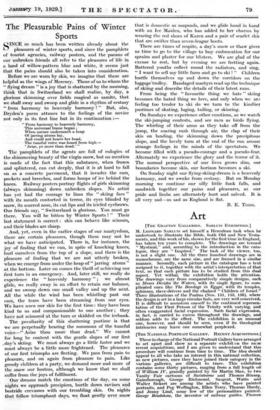The Pleasurable Pains of Winter Sports
SINCE so much has been written already about the pleasures of winter sports, and since the pamphlets of tourist agencies, railway posters, and the paeans of our unbroken friends all refer to the pleasures of life in a land of willow-pattern blue and white, it seems just that the pains should also be taken into consideration.
Before we are worn by skis, we imagine that these are helpful as the wings of Mercury.. Those of us to whom the " flying dream " is a joy that is shattered by the morning, think that in Switzerland we shall realize, by day, a glorious skimming over fields magical as samite, that we shall sway and swoop and glide in a rhythm of ecstasy " from harmony to heavenly harmony ! " But, alas, Dryden's poem attunes to the feelings of the novice not only in its first line but in its continuation :— " From harmony to heavenly harmony,
This universal frame began ; When nature underneath a heap Of jarring atoms lay, And could not heave her head, The tuneful voice was heard from high- ' Arise, ye more than dead.' "
The pamphlets of the agents are full of eulogies of the shimmering beauty of the virgin snow, but no mention is made of the fact that this substance, when frozen and splintered, can cut deeply, that it is at hard to fall on as a concrete. pavement, that it invades the ears, pockets and breeches, and forms lumps of ice behind the knees. Railway posters portray flights of girls skimming (always skimming) down unbroken slopes. No artist has yet had the courage to limn the " skiing face " with its mouth contorted in terror, its eyes blinded by snow, its scarred nose, its cut lips and its icicled eyebrows. Our friends say, " Switzerland is glorious. You must go there. You will be bitten by Winter Sports ! " Their last statement is correct : skis can behave like scissors, and their blades are sharp.
And yet, even in the earlier stages of our martyrdom, there are certain pleasures, though these may not be what we have anticipated. There is, for instance, the joy of finding that we can, in spite of knocking knees; hurl ourselves from the top of a slope, and there is the pleasure of finding that we are not utterly broken, when we emerge from under the heap of " jarring atoms " at the bottom. Later on comes the thrill of achieving our first turn in an emergency. And, later still, we really do experience the " heavenly harmony " ; we almost glide, we really sway, in an effort to retain our balance, and we swoop down one small valley and up the next. All the while the wind has been whistling past our cars, the tears have been streaming from our eyes. We have worn our skis for the first time : they have been kind to us and companionable to one another ; they have not scissored at the turn or skidded on the icebank.
The peculiarity of this shattering pastime is that we are perpetually hearing the summons of the tuneful voice—" Arise thou more than dead." We cannot fOr long be content with the gentle slopes of our first .day's skiing. We must- always go a little faster and we must always be a little more frightened. The pleasures of our first triumphs are fleeting. We pass from pain to pleasure, and on again from pleasure to pain. Like greedy children at a party, we demand more and more of the snow our hostess, although we know that we shall suffer from the joys of fulfilment.
Our dreams match the emotions of the day,, on some nights we approach precipices, hurtle, down ravines and bestride crevasses with our trembling skis. On nights that follow triumphant days, we float gently over snow that is domestic as soapsuds, and we glide hand in hand with an Ice- Maiden, who has added to her charms by wearing the red shoes of Karen and a pair of scarlet skis that are swifter than seven-league boots.
There are times of respite, a day's snow or thaw gives us time to go to the village to buy embrocation for our sprains and plaster for our blisters. We are glad of the excuse to rest, but by evening we are fretting again. Battered youths collect round the radiators, and sing, " I want to sell my little farm and go to ski ! " Children hurtle themselves up and down the corridors on the luggage.trolley. Bandaged martyrs read up the technique of skiing and describe the details of their latest runs.
From being the " favourite thing we hate " skiing becomes the hated thing we love, and only when we are feeling too tender to ski do we turn to the kindlier pastimes of skating, luging, tailing, or skioring.
On Sundays we experience other emotions, as we watch the ski-jumping contests, and see men as birds flying. The whirling of their arms as they take off from the jump, the soaring rush through air, the clap of their skis on landing, the skimming down the precipitous slope, and the lovely turn at the end of the run arouse strange feelings in the minds of the spectators. We become filled with a pseudo-courage and a pseudo-fear. Alternately we experience the glory and the terror of it. The normal perspective of our lives grows dim, our boundaries become skis, our horizon becomes a ski.
On Sunday night our flying-skiing-dream is a heavenly harmony, and we awake from ecstasy. But on Monday morning we continue our silly little funk falls, and sandwich together our pains and pleasures, as our pride and limbs are alternately hurt and salved. It is all very sad—as sad as England is flat.
B. E. TODD.






































 Previous page
Previous page